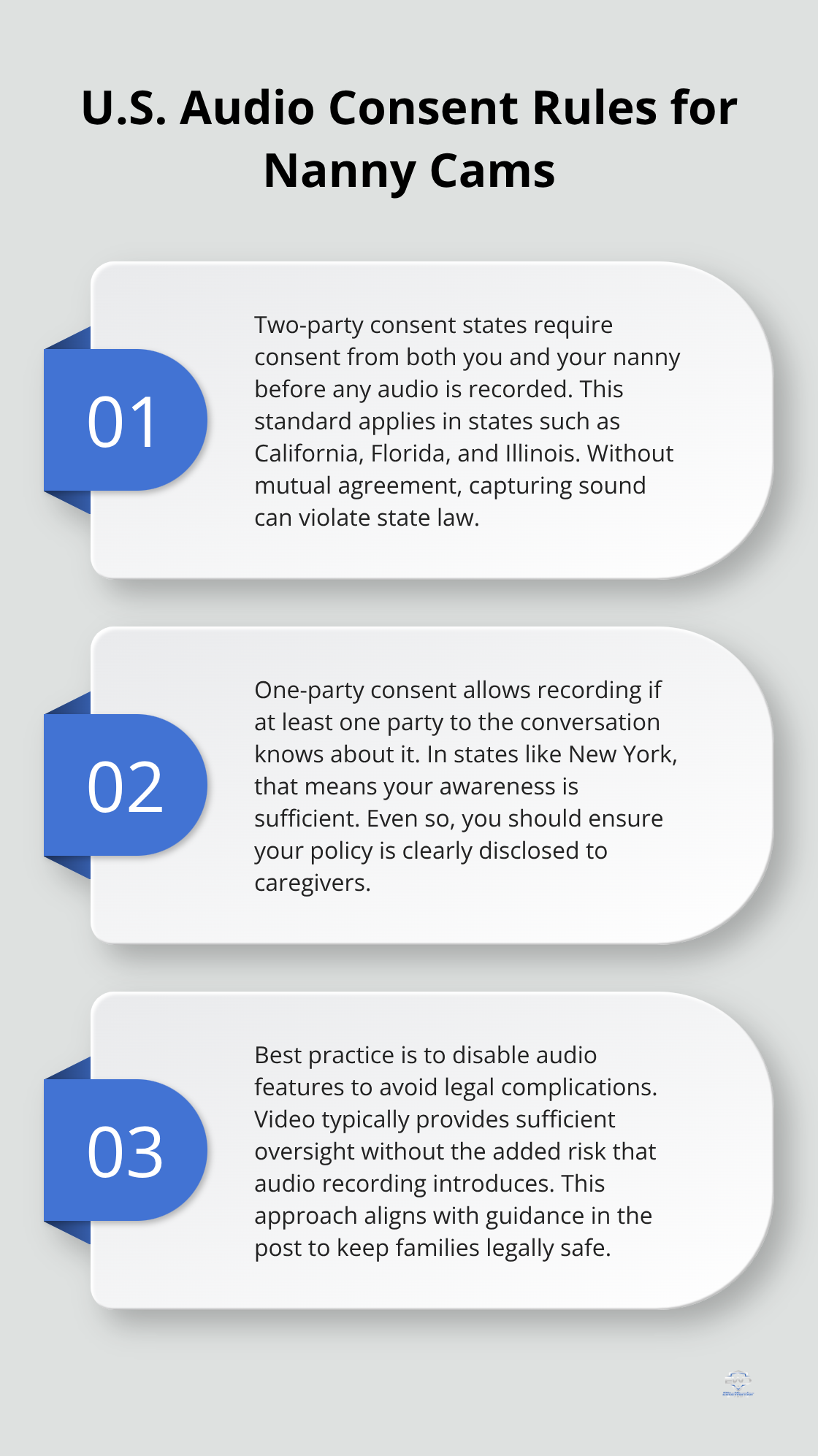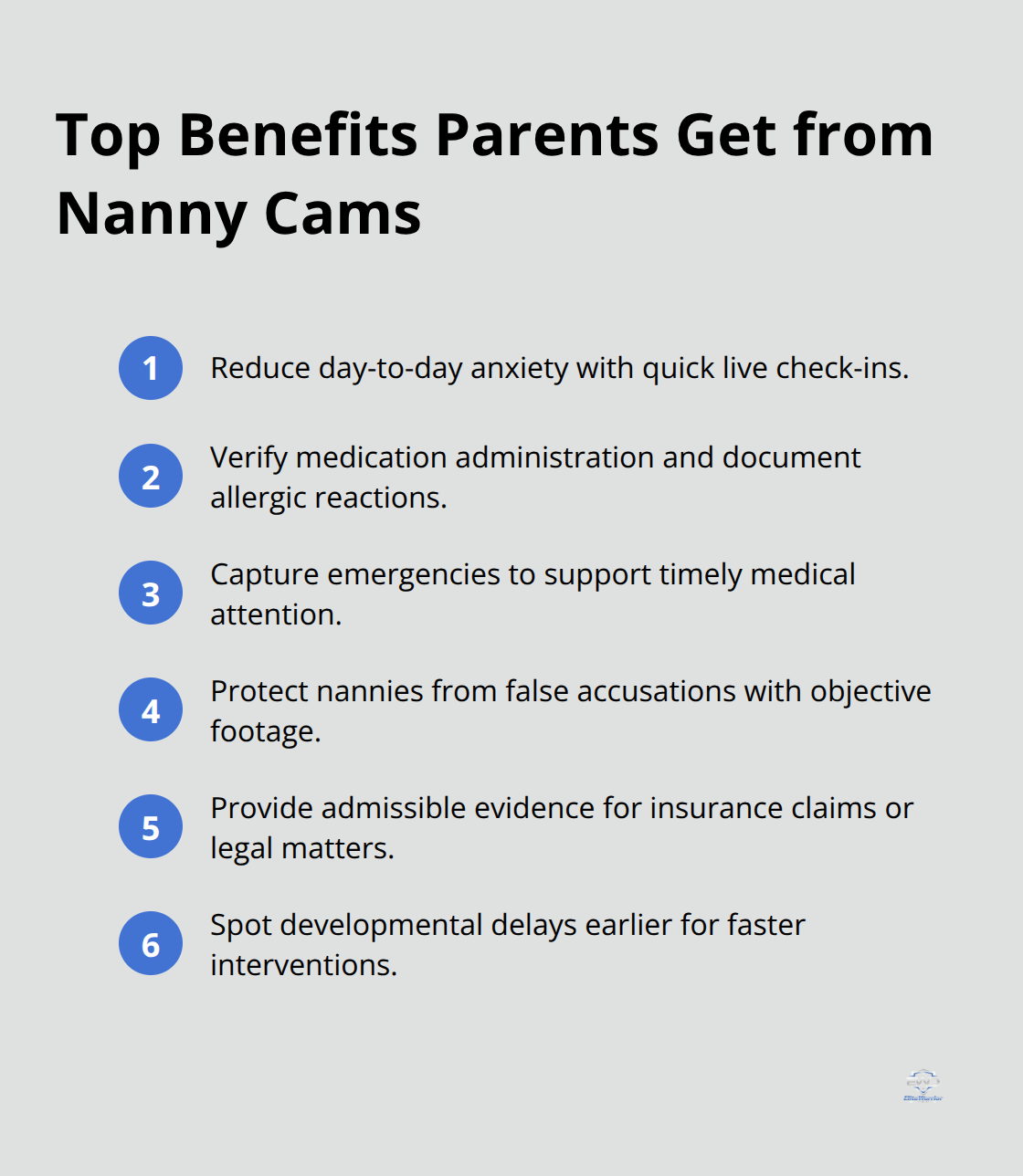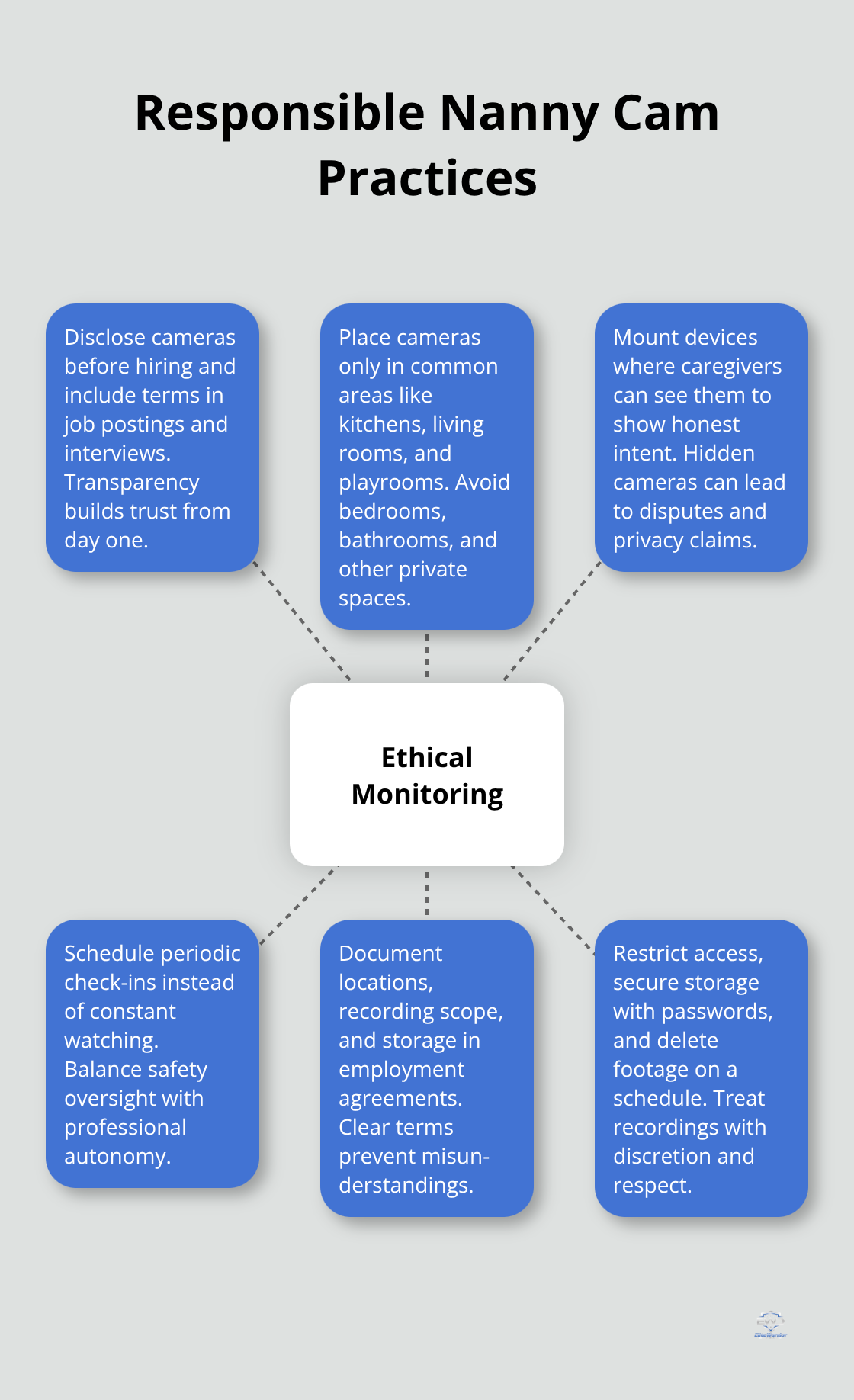Elite Warrior Defense
free shipping on orders over $25
We're having a 15% off sale on all our products. Enter your email below to be notified about future sales.

Installing a nanny cam in your home raises complex questions about privacy, trust, and child safety. Many parents struggle with whether monitoring their caregivers crosses ethical boundaries.
We at Elite Warrior Defense LLC understand these concerns affect families nationwide. This guide examines the legal requirements, benefits, and ethical considerations to help you make the right choice for your household.
Video recording inside your own home operates under federal jurisdiction, and the law strongly supports homeowners. The Fourth Amendment protects against unreasonable searches, but this protection doesn’t apply to employees in your private residence. All 50 states permit video recording without consent when you monitor your own property. Audio recording follows completely different rules that change dramatically by state.
Twelve states (including California, Florida, and Illinois) require two-party consent for audio recording, which means both you and your nanny must agree before any sound gets captured. New York operates as a one-party consent state and allows audio recording as long as you know about it. Violations of these audio consent laws can result in serious legal consequences.

We recommend that you disable audio features entirely to avoid legal complications. Most parents find video monitoring provides sufficient oversight without the legal risks that audio recording creates.
Bathrooms, bedrooms, and changing areas are legally protected spaces where recording violates privacy expectations regardless of state laws. However, courts have ruled that domestic employees may not have reasonable expectations of privacy while working inside the home of their employer. Common areas like living rooms, kitchens, and playrooms offer no reasonable expectation of privacy for employees. Position cameras only in spaces where family activities normally occur to protect yourself from invasion of privacy claims while you maintain effective monitoring of childcare activities.
Understanding these legal boundaries sets the foundation for responsible monitoring, but the real value of nanny cams extends far beyond legal compliance.
Working parents experience constant worry about their children’s safety during business hours. Nanny cams eliminate this anxiety through smartphone apps that deliver live video feeds directly to your device. Modern wireless cameras let you check in during lunch breaks, important meetings, or whenever concern arises. Parents who use monitoring systems report reduced anxiety about leaving children with caregivers according to childcare research studies. The technology proves especially valuable for mothers who return to work after maternity leave, as separation anxiety often affects their job performance significantly.

Recorded footage serves multiple protective functions that benefit everyone in childcare arrangements. Video evidence can verify proper medication administration, document allergic reactions, or capture emergency situations that require medical attention. The cameras also protect nannies from false accusations of neglect or inappropriate behavior, which creates accountability that works both ways. Video recording is legal in all states when parents record in their own homes, making these devices valuable for insurance claims or legal proceedings. Parents have used recorded evidence to identify developmental delays early, which allows for faster intervention and better outcomes for children.
Nanny cams show actual caregiving practices rather than relying on verbal reports alone. You can observe whether educational activities occur as promised, screen time limits receive respect, and safety protocols get proper implementation. The footage reveals interaction quality between your child and caregiver, which helps you identify personality mismatches or exceptional care that deserves recognition. Many parents find that their initial concerns were unfounded, while others catch concerning behaviors that require immediate attention (such as negligent conduct or safety violations). This objective monitoring helps you make informed decisions about employment relationships based on observed behavior rather than assumptions.
While these benefits make nanny cams attractive to many families, responsible use requires careful attention to ethical boundaries and transparent communication practices. Choosing the right nanny cam protects your family while maintaining trust with caregivers.
You must discuss nanny cams before employment starts, not after someone begins work in your home. Add camera disclosure to your job postings and address monitoring during interviews to prevent trust issues later. Parents who are considering using a nanny cam need to evaluate their ethical beliefs regarding privacy and videotaping their employee secretly. Write down exact camera locations, what they record, and how you store footage in employment agreements. New York employment law experts recommend this documentation protects both parties from confusion about surveillance expectations.
Install cameras exclusively in kitchens, living rooms, and playrooms where normal family activities happen throughout the day. Bedrooms, bathrooms, guest rooms, and private spaces stay completely off-limits for ethical monitoring regardless of legal permissions. It is generally legal to install nanny cameras in your home for monitoring the safety of your children and property. Mount devices where caregivers can see them rather than hide them to show honest intentions about your activities. Parents who hide cameras in stuffed animals or picture frames often face employment disputes and privacy invasion claims (according to childcare employment attorneys).
Plan specific times to speak with caregivers rather than watch live feeds continuously throughout your workdays. Excessive monitoring creates stress that hurts job performance and child interactions according to workplace psychology research. Set specific times each week to review footage rather than check daily, which breeds paranoia and resentment. Professional nannies prefer families who trust their expertise while they maintain reasonable oversight for safety purposes. Parents who balance monitoring with respect report better caregiver retention rates and improved child outcomes compared to families who watch constantly.

Limit who can view recorded footage to immediate family members only and establish strict rules about sharing or discussing content. Store recordings securely with password protection and delete footage after reasonable time periods unless you need it for specific safety concerns. Professional caregivers deserve privacy protection even while they work in your home, which means you should treat recorded material with appropriate discretion and respect.
Nanny cam technology provides parents with powerful tools to monitor childcare while it raises important privacy questions. The security benefits include reduced parental anxiety, objective evidence collection, and real-time oversight of care quality. These advantages must balance against ethical concerns about employee privacy and trust relationships.
Responsible nanny cam use requires transparent communication with caregivers before employment begins. Parents should disclose camera locations, explain monitoring purposes, and respect privacy boundaries in bedrooms and bathrooms. Regular check-ins work better than constant surveillance to maintain healthy working relationships.
The decision to install monitoring equipment depends on your family’s specific needs and comfort levels. Parents with new caregivers or safety concerns may find cameras provide necessary peace of mind (while others prefer to build trust through open communication and regular feedback sessions). We at Elite Warrior Defense LLC offer home security systems that help parents make informed decisions about childcare oversight while they respect everyone’s privacy rights.
Estimated reading time: 7 minutes